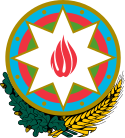
The Politics of Azerbaijan take place in an authoritarian system where elections are not free and fair, political opponents are repressed, civil rights are limited, human rights abuses are widespread, corruption is rampant, and power is concentrated in the hands of President Ilham Aliyev and his extended family.
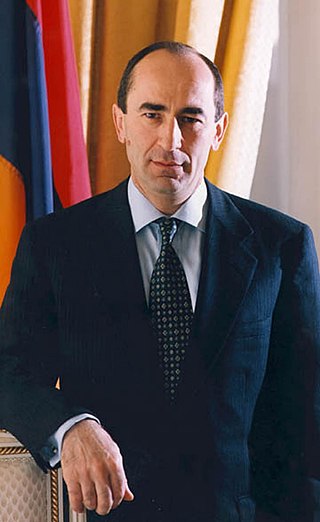
Robert Sedraki Kocharyan is an Armenian politician. He served as the President of the Nagorno-Karabakh Republic from 1994 to 1997 and Prime Minister of Nagorno-Karabakh from 1992 to 1994. He served as the second President of Armenia between 1998 and 2008 and as Prime Minister of Armenia from 1997 to 1998.

Heydar Alirza oghlu Aliyev was an Azerbaijani politician who was a Soviet party boss in the Azerbaijan Soviet Socialist Republic from 1969 to 1982, and the third president of Azerbaijan from October 1993 to October 2003.
Articles related to the Azerbaijan Republic include:

The Azerbaijani Popular Front Party is a political party in Azerbaijan, founded in 1989 by Abulfaz Elchibey. Since Elchibey was ousted from power in the 1993 military coup, the party has been one of the main opposition parties to the Heydar Aliyev and Ilham Aliyev authoritarian regimes.
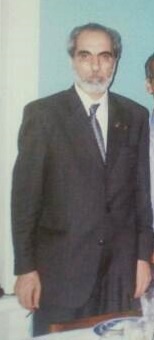
Abulfaz Gadirgulu oghlu Aliyev, better known as Abulfaz Elchibey, was an Azerbaijani politician, Azerbaijani nationalist and Soviet dissident who was the first and only democratically elected President in post-Soviet Azerbaijan. He was the leader of the Azerbaijani Popular Front and played an important role in achieving Azerbaijan's independence from the Soviet Union.

Levon Hakobi Ter-Petrosyan, also known by his initials LTP, is an Armenian politician and historian who served as the first president of Armenia from 1991 until his resignation in 1998.

Ayaz Niyazi oghlu Mutallibov was an Azerbaijani politician who served as the first president of Azerbaijan. He was the last leader of Soviet Azerbaijan, and first President of Azerbaijan from 18 May 1990 until 6 March 1992 and from 14 May until 18 May 1992.

Politics of Artsakh took place within the constraints of a written constitution, approved by a popular vote, that recognises three branches of government: executive, legislative and judicial. The executive branch of government was exercised within a framework of a presidential representative democratic republic, whereby the President of Artsakh was both the head of state and the head of government. The legislative branch of government was composed of both the Government and the National Assembly. Elections to the National Assembly were on the basis of a multi-party system. As of 2009, the American-based non-governmental organisation, Freedom House, ranks Artsakh above both Armenia and Azerbaijan in terms of political and civil rights. The republic was de facto independent and de jure a part of Azerbaijan. None of the elections in Artsakh were recognised by international bodies such as the OSCE Minsk Group, the European Union or the Organisation of Islamic Cooperation. Both Azerbaijan and Turkey had condemned the elections and called them a source of increased tensions.

The First Nagorno-Karabakh War was an ethnic and territorial conflict that took place from February 1988 to May 1994, in the enclave of Nagorno-Karabakh in southwestern Azerbaijan, between the majority ethnic Armenians of Nagorno-Karabakh backed by Armenia, and the Republic of Azerbaijan with support from Turkey. As the war progressed, Armenia and Azerbaijan, both former Soviet republics, entangled themselves in protracted, undeclared mountain warfare in the mountainous heights of Karabakh as Azerbaijan attempted to curb the secessionist movement in Nagorno-Karabakh.
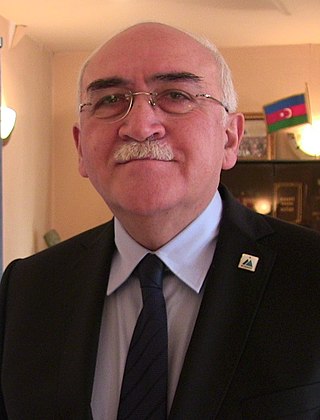
Isa Yunis oghlu Gambar, also known as Isa Gambar, is an Azerbaijani politician and leader of the Equality Party (Müsavat), one of the opposition blocs in Azerbaijan. He was elected a member of parliament in 1990 and was elected parliamentary speaker in 1992.

Vazgen Mikayeli Manukyan is an Armenian politician who served as the first Prime Minister of Armenia from 1990 to 1991. From 1992 to 1993, during the First Nagorno-Karabakh War, Manukyan was acting Defence Minister of Armenia. He was also a member of Armenia's parliament from 1990 to 2007.

The Azerbaijan Communist Party is a communist party in Azerbaijan. AzKP was set up in 1993 by Ramiz Ahmadov and registered by the Justice Ministry in 1994.
Surat Davud oghlu Huseynov was an Azerbaijani military officer and politician who served as Prime Minister after ousting Azerbaijan President Abulfaz Elchibey in the 1993 Azerbaijan military coup.
This page lists in alphabetical order articles related to the Republic of Artsakh and Nagorno-Karabakh region. For a topically arranged list of articles, please see Outline of the Republic of Artsakh.

Union for National Self-Determination is an Armenian political party. It was founded in 1987 by Paruyr Hayrikyan, a Soviet dissident seeking independence for Armenia.
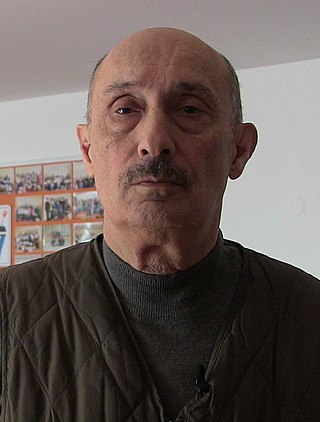
Zardusht Mammad Mubariz oglu Alizadeh is an independent Azerbaijani political analyst and former politician. He is known for his interviews, political comments and articles criticizing the heavy-handed rule of the ruling New Azerbaijan Party.

The Union of Soviet Socialist Republics (USSR) was dissolved on 26 December 1991 by Declaration № 142-Н of the Soviet of the Republics of the Supreme Soviet of the Soviet Union, formally establishing the dissolution of the Soviet Union as a sovereign state and subject of international law. It also brought an end to the Soviet Union's federal government and General Secretary Mikhail Gorbachev's effort to reform the Soviet political and economic system in an attempt to stop a period of political stalemate and economic backslide. The Soviet Union had experienced internal stagnation and ethnic separatism. Although highly centralized until its final years, the country was made up of 15 top-level republics that served as the homelands for different ethnicities. By late 1991, amid a catastrophic political crisis, with several republics already departing the Union and the waning of centralized power, the leaders of three of its founding members, the Russian, Belorussian, and Ukrainian SSRs, declared that the Soviet Union no longer existed. Eight more republics joined their declaration shortly thereafter. Gorbachev resigned on 25 December 1991 and what was left of the Soviet parliament voted to end itself.

The 1993 Azeri coup d'état, also known as the Ganja Uprising, was a military coup led by Azerbaijani military commander Surat Huseynov. On June 4, 1993, Huseynov's forces lead a march from the city of Ganja to the Azerbaijani capital of Baku in order to overthrow President Abulfaz Elchibey who was elected in independent Azerbaijan's first free election in 1992.
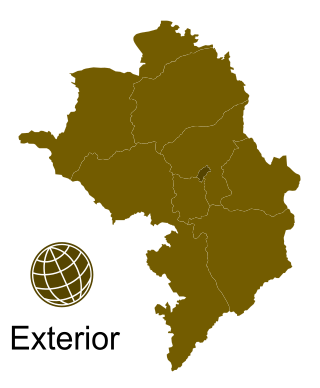
General elections were held in the Republic of Artsakh on 31 March 2020, with a second round of the presidential election on 14 April. Voters elected the President and 33 members of the National Assembly. It was the first time the President and National Assembly were elected at the same time.
